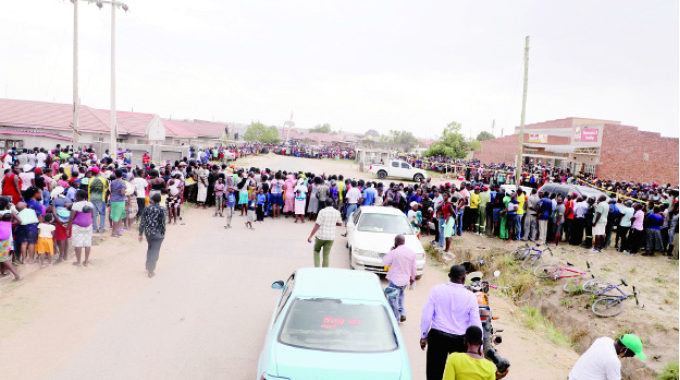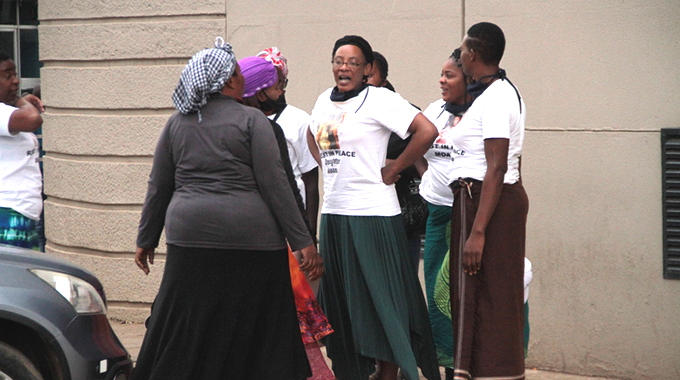EDITORIAL COMMENT : Pay rise built on fundamentals

The agreement on the exceptionally long negotiations between civil service unions and Government in the National Joint Negotiating Council finally reached a conclusion early this week on the salary awards for this year, but more importantly on the process.
Unions made it clear that they wanted salaries and allowances to return to the purchasing power they had in October 2018.
For almost a decade growing budget deficits had been financed through what amounted to electronic printing of fake US dollars and pretending.
In actual technical terms what was happening was that the First Republic was building up huge short-term low-interest debt through overdrafts with the Reserve Bank of Zimbabwe and issuing Treasury Bills.
All this extra money supply was denominated in US dollars, although there were far too few real dollars to back that debt.
The second problem was that despite growing warnings from the banking sector and from competent and sober economists, it suited most people to continue to pretend that all these extra dollars generated out of thin air were real US dollars.
This deliberate mass delusion kept the lid on what should have been a spiralling rise in inflation, that would have forced remedial action much earlier, and started making the fundamentals a lot worse in other areas by the huge draining of real US dollars into imports and overseas payments, often for things that we either did not need or things that we could have made at home, and made cheaper if that huge pool of excess created liquidity was correctly valued.
That in turn saw our imports rapidly rise while exports remained stable, so that deficit in the balance of payments became worse. As with all fantasies, and even mass fantasies, the day comes when reality intrudes and that happened in 2018.
The first signs were seen as “cash barons” started charging a premium for US dollar banknotes. Demand for cash was rising as businesses and importers started desperately trying to pay their bills with ever longer banking delays.
No one really panicked at the beginning, pretending it was just inefficiencies in the banking system that was drying up ATMs, but it was the first sign that the whole pretence was becoming unzipped, and all those newly-created dollars in the RTGS system were going to be seen as what they were, a local currency denominated in US dollars, but in actual fact something else entirely.
And so we had that awful 18 months. A total economic meltdown was avoided, and quite a bit of economic growth was possible, by a fortuitous co-incidence.
There had been an election, President Mnangagwa had won, he understood the basics of the underlying economic explosion, brought in technocrats and gave orders for things to be fixed.
In other words he wanted the fantasy-land abolished and the real world embraced as a necessary condition for the real and major reforms of creating a fast-growing sustainable and viable economy, based on reality not on numbers on bits of paper.
The inherited mess was worse than we expected or most experts anticipated. The Treasury, where the reforms had to start, had within a month brought the deficit budgeting under control with at least the recurrent costs paid for out of taxes.
That did see a further cut in other Government spending, but at least we were no longer printing money.
That still left the large lake of money we had printed. So we acknowledged it existed, converted it into a local currency, which in fact it had been for several years. The Transitional Stabilisation Programme set the period to the end of this year.
Covid-19 intervened, and over three months the remaining scum rose to the surface rather quickly. This in turn allowed an acceleration in the transitional process, now needed as fire-fighting.
The long-planned auction system for foreign exchange was brought in a little earlier, the remnants of allotting foreign currency at fake rates through bureaucrats at the Reserve Bank were quickly folded up, inflation rates, accelerating towards a meltdown, collapsed.
And by August we could all raise our heads and look at reality and figure out what we now needed to do.
Although there are many, with very selective memories, who try and claim that the 2009 total collapse of the old Zimbabwe dollar was not as bad, they are not remembering right.
At that stage, the new salaries were trivial, and regrettably only grew by the fake printing of new money. The dollarisation almost killed the remaining industrial base so damaged by hyperinflation and while it brought a temporary stability it did so at the cost of zero growth, growing inequality and low standards of living without much hope of raising these, at least in a real world.
So civil servants and others looking at the purchasing power of their income need to compare this with 2009, perhaps 2010 if you want to push it and take into account some reorganisation, and not what we pretended we were earning later on.
The private sector has led the rise in salaries over the last few months, as businesses took advantage of the new stability to fix their accounts. That, considering the Government’s total determination never again to borrow or print for recurrent expenditure, could have been expected.
As tax revenues rose, at least in nominal terms, with the extra PAYE from those pay rises and the VAT from the spending of those pay rises, Government could do something about its own salaries.
So there were the two interim awards, the initial final offer of another 20 percent and then, thanks to the negotiating delays, the final offer of the 41 percent the civil servants have now received.
Government has acted fairly, as revenues grew it made sure its employees received their share. Even the final doubling of the fist offer was not a result of pressure, but simply the extra revenue flowing in from businesses reviving after the initial lockdown and so passing on more taxes, more PAYE and more VAT.
It is fairly obvious that while Government was determined to maintain its fiscal discipline, regardless of industrial action, it was also ready as soon as it had the money to pay its own staff more, and showed its good faith with those unilateral interim awards.
Neither Government, nor civil servants, think that the present salaries are wonderful. There is agreement there. But affordability is vital if Zimbabwe is to grow. The only way our standard of living, regardless of who we are or where we work, can rise significantly is if the economy grows and real wealth is created.
We can never again pretend, but we can all press ahead with ensuring that we do create real wealth, as has been laid out in the new National Development Strategy.
The civil service unions need to ensure that their share of the taxes from that new wealth does filter down to their members, and they should demand actual accounts if necessary. But no one, in private or public sectors, can pretend any longer that we can create wealth out of thin air. It has to be real if we are to have a chance.










Comments